Keynote Speakers
-
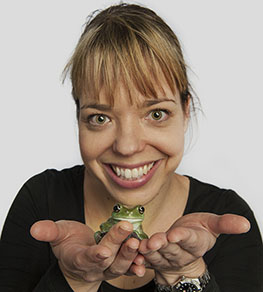
SSAR President's Travelogue: Amphibian adventures in Australasia: from frogs that sing like birds to tadpoles with fangs
Jodi Rowley, Australian Museum, UNSW
BIO: I’m a biologist with a focus on Australasian amphibian diversity, ecology and conservation.
Growing up in Sydney, I completed my undergraduate degree at the University of New South Wales (Sydney, Australia), and my PhD at James Cook University (Townsville, Australia). During my PhD I investigated how behaviour influences how susceptible frog species are to decline from disease (by attaching radio-transmitters to frogs and stalking them through the rainforest for weeks!).
In 2006, I moved to Cambodia to work as a wildlife biologist for international conservation organisation Conservation International and began conducting amphibian research and scientific capacity-building in Southeast Asia. So far, I’ve conducted almost 30 expeditions in Southeast Asia (mainly Vietnam) in search of amphibians. I work with an amazing group of friends and colleagues.
I joined the Australian Museum (Sydney, Australia) in 2008, and my research continues to uncover and document amphibian biodiversity, assess conservation status, and inform conservation decisions. I feel strongly about making sure my research (and that of others) contributes towards conservation decisions. I am Chair of the Mainland Southeast Asia Branch of the IUCN Species Survival Commission Amphibian Specialist Group, a Regional Coordinator of the IUCN Amphibian Red List Authority, Member of the NSW Threatened Species Scientific Committee and the national Bush Blitz Scientific Reference Group and Editor for the international systematic journal Zootaxa.
-
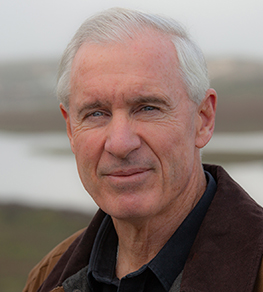
Jaws, lost sharks, and the legacy of Peter Benchley
David A. Ebert, Ph.D., Director - Pacific Shark Research Center, Moss Landing Marine Laboratories
BIO: Dr. Dave Ebert has devoted his life to studying the ocean's most elusive, dangerous and yet fascinating predator - the shark! Author of 30 books, including the forthcoming “Sharks of the World”, Dave holds numerous positions including President of the American Elasmobranch Society, Director of the Pacific Shark Research Center, Scientific Advisor to the United Nations Food and Agriculture Organization, Research Associate at the California Academy of Sciences and South African Institute for Aquatic Biodiversity, and the IUCN Shark Specialist Group. He is founder of the Lost Sharks project and co-host of the podcast Beyond Jaws!
-
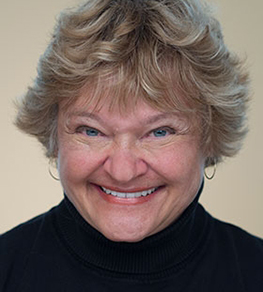
Sex and the single fish: why gobies evolved hermaphroditism so many times
Kassi Cole (past-president, ASIH), University of Hawaii at Monoa
BIO: Dr Cole is the past president of ASIH and a faculty member at the University of Hawaii at Manoa. Her interests focus on the evolution of behavioral, morphological and developmental processes among vertebrates, with a concentrated interest in reef fishes.
-
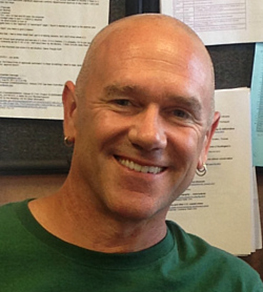
What the ASIH does and what the ASIH should do: Some stories about the ASIH from someone that probably should know more about the ASIH
Christopher Beachy (past-president, ASIH), Southeastern Louisiana University
BIO: Dr Beachy is a past president of ASIH and a faculty member at Southeastern Lousianna University. His research is in two related areas: (1) life history biology and (2) metamorphosis. His work uses surveys and experiments with amphibians that allow us to understand the relationship between metamorphosis and life history evolution.
-
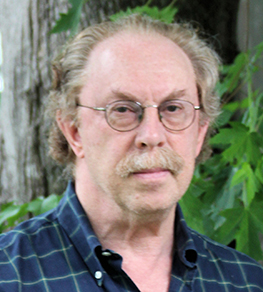
Bufonem ex machina
David Green (past-president, HL), McGill University
David M. Green was born in Vancouver, Canada, in 1953. He obtained his B.Sc. (with honors) in Zoology from the University of British Columbia (1976) and both his M.Sc. (1979) and his Ph.D. (1982) in Zoology from the University of Guelph. He did postdocs at the University of California, Berkeley, and McMaster University. He is currently a full professor at the Redpath Museum of McGill University. He has served as Director of the Redpath Museum, Chair of the Committee on the Status of Endangered Wildlife in Canada, and President of the Society for the Study of Amphibians and Reptiles, the Herpetologists' League and the Canadian Herpetological Society. He has more than 150 publications, the great majority of which concern the biology of amphibians in one way or another.
-
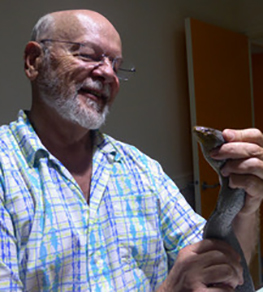
Splashing around with sea snakes in paradise
Richard Shine (past-president, SSAR), Macquarie University
Rick is past-president of SSAR, and has conducted research on the ecology and behaviour of snakes in many parts of the world. For the last 20 years, much of that work (“work”?) has involved snorkelling around in shallow water on coral reefs in the IndoPacific region, peering into the lives of various kinds of marine serpents. In the process, he and his collaborators have assembled a uniquely detailed dataset on these mysterious and imperiled ocean predators.
-
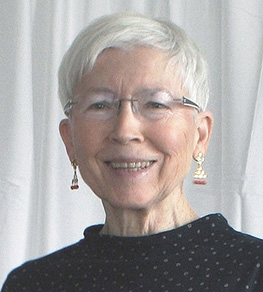
2021 HL Distinguished Herpetologist: Fifty Years of Anole Censuses at Barro Colorado Island: Density Decline and Biodiversity
Robin Andrews, Virginia Tech
Our fifty years of censusing Anolis apletophallus (formerly A. limifrons) has had two conceptual motivations. In the early 1970’s, our motivation was to test the then paradigm that populations of tropical plants and animals were more stable than those of the temperate zone. Dramatic fluctuations in abundance of A. apletophallus during the first three decades of censusing documented, as did other contemporary studies, that tropical populations fluctuate every bit as much as populations at north latitudes. The conceptual motivation is now climate change. Since 1971, rainfall events BCI have become shorter and more intense (while annual rainfall has not changed) and nighttime temperature has increased. Overall, abundance of A. apletophallus has declined. The three best predictors of abundance and population growth rate are the Southern Oscillation Index (SOI) (positive), the minimum value of mean monthly minimum temperature (negative), and annual rainfall (negative). Of these predictors, annual rainfall has a mechanistic link to lizard abundance; annual rainfall alters the interaction between A. apletophallus eggs and their major predator, Solenopsis ants. High rainfall negatively affects egg survival because high moisture enhances foraging by Solenopsis in the litter where eggs are laid and hence increases predation on eggs. Overall, the positive association between abundance and SOI indicates that abundance is higher after the cooler and wetter La Niña years and lower after the warmer and drier El Niño years. The prediction of more extreme El Niño events in the future implies that abundance of A. apletophallus at BCI will continue to decline.
BIO: Robin Andrews is currently a Professor Emerita in the Department of Biological Sciences at Virginia Tech where she was on the faculty since 1976. She received her BA from the University of Minnesota (1964), her AM from Harvard University (1967), and her PhD from the University of Kansas (1971). Her research interests span life history evolution and the physiological ecology of squamate eggs and embryos. She is a co-author of Pough et al., Herpetology (2016). Her service to SSAR includes the editorial Board for the Journal of Herpetology, Board of Directors, Nominating Committee Chair, Kennedy Student Prize Committee, and President. She has served on the ASIH Board of Governors and on the HL Best Student Paper Award Committee.
-
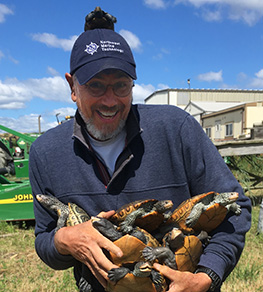
Overcoming the curse of Sisyphus: progress in terrapin conservation
Willem Roosenburg (past-president, HL), Ohio University
Willem Roosenburg is a classically trained ecologist and population biologist who empirically learned the need for effective conservation as he witnessed and documented the anthropogenic threats to his study organism, the Diamond-backed Terrapin. He quickly realized that data used to address academic questions also provides insights into effective conservation and management. Throughout his career, he found that conservation goals are challenged by politics and the desires of multiple stakeholders. By working across agencies and institutions, he contributed to the implementation of successful conservation strategies for terrapins thereby providing an example of how we may be successful for other species.
-
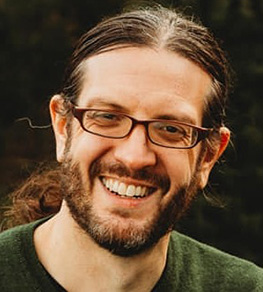
Virtual specimens and imaginary fishes: ichthyological education in a transforming world
Brian L. Sidlauskas, Oregon State University
Brian Sidlauskas is an associate professor in the Department of Fisheries, Wildlife and Conservation Sciences at Oregon State University. The son of a fisherman and an art teacher, he grew up along the coast of historic Salem, Massachusetts. He completed an A.B. in Biological Sciences at Cornell University in 1998, received a doctorate in Evolutionary Biology from the University of Chicago in 2006, and was a postdoctoral scholar at the National Evolutionary Synthesis Center in Durham, NC from 2006 to 2009. His research investigates the evolution, ecology and diversity of fishes on scales ranging from local to global. Many of his projects have involved the phylogenetics and diversification of the world’s 2000 species of characiform fishes, with particular focus on the headstanding fishes of South America (family Anostomidae). A recently discovered species in that family, Leporinus sidlauskasi, was named in his honor. He has conducted biodiversity surveys in Oregon, Africa and South America, and discovered and described species of fishes from all three regions. Dr. Sidlauskas teaches popular courses on Ichthyology, Systematics of Fishes, and Conservation Genetics, and has been recognized several times for outstanding pedagogy and mentorship, and for technological innovation in the online versions of his courses. He advises several graduate students and has involved dozens of undergraduates in the research and curation of the quarter-million preserved fishes in the Oregon State Ichthyology Collection. He is married to Rae Sidlauskas, a counselor, and the couple are the proud parents of a young daughter named Fiona.
-
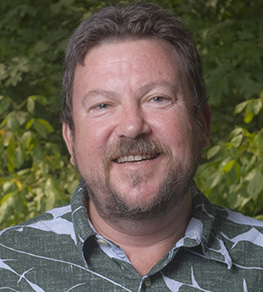
Making suckers and toads interesting in the 21st Century
Gary D. Grossman, Warnell School of Forestry and Natural Resources
Gary Grossman has been a faculty member in the Warnell School of Forestry and Natural Resources since 1981 with expertise in multiple aspects of community/population ecology, animal behavior and STEM pedagogy. He is primarily an experimentalist interested in mechanisms but his published work is diverse ranging from long-term descriptive studies of community/population structure and function, dexvelopment and tests of fitness-based models for microhabitat selection in animals, ecological statistics, and the use of music and video to teach STEM,. Prof. Grossman has been the author or coauthor of over 140 scientific articles that have been cited over 8300 times. His website includes professional and personal activities is located at www.garygrossman.net.
-
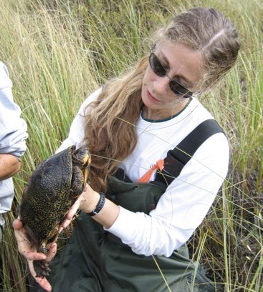
2021 ASIH Johnson Award
2020 HL Distinguished Herpetologist:
Chasing catastrophes slowly: A career studying turtle population patterns.Jackie Litzgus, Laurentian University
BIO: I have had the rare privilege to turn my childhood fascination into a career. I grew up catching snakes, turtles and toads in the wild places near my house. As a professor at Laurentian University, I enjoy sharing my passion for these animals and their conservation with students in the classroom and field.
I did my BSc and MSc degrees at the University of Guelph, Ontario. After my MSc, I worked in the Cryobiology Lab at Miami University, Ohio, where I gained an appreciation for the incredible winter adaptations of herps. Then, I moved to South Carolina to do a PhD at USC.
-
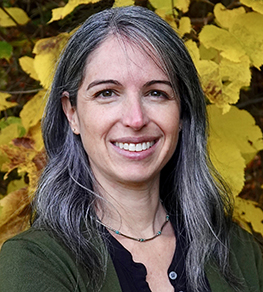
2021 Meritorious Teaching Award in Herpetology
Teaching Herpetology: Batrachian Barf Bowls and other educational experimentsAlison Davis Rabosky
Bio: The 2021 recipient of the Meritorious Teaching Award in Herpetology, Alison Davis Rabosky, was born and raised in the herping paradise and JMIH 2021 host location of Phoenix, Arizona. She has been passionate about science education, mentoring, and outreach since high school, when she first volunteered for the Hands On Science program for elementary students. Now an Assistant Professor and Curator of Herpetology at the University of Michigan, her teaching goal is to give the next generation appreciation for the spectacular diversity of reptiles and amphibians and to empower them with the tools to take on the big questions in biodiversity.
-
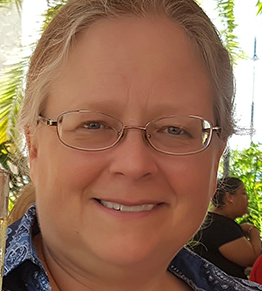
2021 ASIH Joseph S. Nelson Award
Power, suction feeding, and unexpected intersections during a career in ichthyologyElizabeth Brainerd
BIO: Elizabeth (Beth) Brainerd is the recipient of the 2021 Joseph S. Nelson Lifetime Achievement Award in Ichthyology. She is currently the Robert P. Brown Professor of Biology at Brown University and previously was an Assistant/Associate Professor at the University of Massachusetts Amherst. She did her doctoral studies at Harvard with Professor Karel F. Liem where she developed a passion for ichthyology roaming the catacombs of the MCZ fish collection and was introduced to the glories of fishes in their natural habitats at the University of Washington's Friday Harbor Labs. She has strayed into herpetology, ornithology and mammalogy in her career, but fishes, and Tetraodontiformes in particular, are her first love.